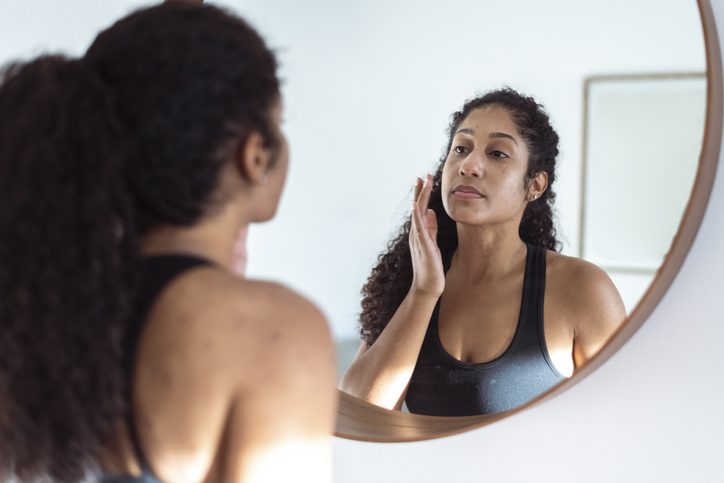Table of Contents
When it comes to achieving flawless skin, many of us think about using products to smooth, hydrate, and clear up acne. However, we may overlook a key factor in getting a glowing complexion: the effects of sugar on skin.
You may already know that consuming too much added sugar can negatively affect your health and weight, but it can also wreak havoc on your skin.
Read on to learn about the effects of sugar on skin and what you can do to minimize the damage of added sugars.
How Is Sugar Bad for Your Skin?
“Refined sugars are harmful for your body in many ways,” says Joshua Zeichner, MD, director of cosmetic and clinical research in dermatology at Mount Sinai Hospital in New York City.
When you eat foods high in sugars, your levels of insulin and blood sugar rise. Consistently consuming excessive amounts of added sugars — in place of other beneficial nutrients like omega-3s, fiber, and antioxidants — may lead to things like inflammation, acne, and aging skin.
The Negative Effects of Sugar on Skin
Here’s a look at two reasons why sugar may be harmful to your skin.
Sugar and acne
“High intakes of added sugar have been associated with acne breakouts,” Zeichner says. A study of participants with mild to moderate acne found that those who followed a low glycemic load diet for 10 weeks saw improvements in skin.
Sugar and wrinkles
Too much added sugar may also lead to what dermatologists call “sugar sag,” explains Rajani Katta, MD, clinical professor of dermatology at McGovern Medical School.
Studies have shown that consuming too much sugar can negatively impact collagen and elastin. Collagen helps keep our skin elastic, Katta explains, so when the collagen fibers are weakened, your skin appears less taught.
High added sugar-intake over time can also increase advanced glycation end products (AGEs) in skin. AGEs can contribute to signs of aging in skin.
Therefore, significantly reducing sugars in your diet may help lower glycation in skin in the long run.
Can I Undo Damage to My Skin Done by Sugar?
Changing your diet can help support your overall health and your skin. Specifically, “eating a low glycemic index diet can help reduce the inflammation,” Katta explains. Inflammation can have a negative impact on skin.
For example, in a small study of young men published in the American Journal of Clinical Nutrition, those who went on a low-glycemic diet for 12 weeks saw improvements in their skin compared to a control group.
But you don’t have to eliminate all carbs; instead, focus on replacing refined and processed carbs with whole grains, vegetables, and fruit and avoiding (or at least limiting) foods high in added sugar.
On the other hand, you cannot undo the damage caused to collagen, Katta says.
“But if you are careful going forward, you can slow down that process and possibly avoid more damage,” she adds. Additionally, some of the substances in fruit and vegetables as well as herbs and spices may inhibit the production of AGEs.
Finally, keep in mind that diet is only one part of healthy skin. Sometimes medication is also needed, so talk to a dermatologist if you have concerns about your skin.
Can Sugar be Good for Your Skin?
Eating too much sugar can negatively impact your skin health. But it’s important to note that, broadly speaking, there are two kinds of sugar: added sugar and naturally occurring sugar. And they can impact your skin differently.
Added sugar is added to foods during the manufacturing process and can lead to the negative skin affects mentioned above. But natural sugar appears in foods (you guessed it) naturally and may not have as negative an impact on your skin as added sugars.
Foods with natural sugars, such as fruit and vegetables, also contain fiber, which can help promote health and healthy gut bacteria that can also help benefit our skin, Katta says.
Colorful produce also is a source of antioxidants, vitamins, and phytonutrients, all of which support skin health. So don’t worry that your morning blueberries or afternoon pear will ruin your complexion.
Topical benefits of sugar on skin
While eating added sugars has next to no physical health benefits, using sugar topically may. Consider sugar scrubs and sugar waxing. “Because the surface of sugar is relatively smooth, it offers gentle manual exfoliation,” Zeichner explains.
Sugar scrubs may be particularly good for sensitive areas of the body such as the lips, he adds.
As for sugar waxing, this involves combining sugar with lemon juice to create a wax-like mixture. After applying this to the skin, you let it harden and then remove it — along with your hair.
“Many people feel that sugaring is a more gentle option for hair removal than traditional waxing,” Zeichner says.
How Much Sugar Is Too Much?
The American Heart Association recommends that women eat no more than six teaspoons (25 g) of added sugar a day, and men have no more than nine teaspoons (36 g). Some signs that you’re eating too much sugar include mood swings and sugar dependency.
However, it’s important to consider not only “how much sugar you eat, but how your body responds to sugar,” Katta says. “Everybody is different, and some people are more sensitive than others to the effects of added sugars.”










More Stories
United Healthcare’s ransomware attack shows why supply chains are under siege
Nutrition Tips For Ramadan | JM Nutrition
Probiotics for IBS | The Nutritionist Reviews